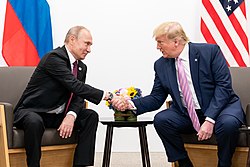| Trump–Russia relations |
|---|
 |
This is a timeline of major events in the first half of 2017 related to the investigations into links between associates of Donald Trump and Russian officials that are suspected of being inappropriate, relating to Russian interference in the 2016 United States elections. Following the timeline of Russian interference in the 2016 United States elections before and after July 2016 up until election day November 8 and the post-election transition, this article begins with Donald Trump and Mike Pence being sworn into office on January 20, 2017, and is followed by the second half of 2017. The investigations continued in the first and second halves of 2018, the first and second halves of 2019, 2020, and 2021.






